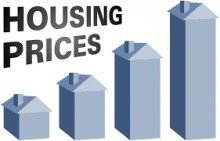Post-crash fall in housing costs softened living standards squeeze but recent increases risks holding back the recovery
The rising share of income spent on housing over the last two decades is equivalent to a 10p increase in the basic rate of tax for a typical family, according to new Resolution Foundation analysis published today (Tuesday).
The analysis, which forms part of the Foundation’s forthcoming housing audit, finds that the share of income spent on housing costs was stable for most of the 1990s and early 2000s at around 17 per cent. However, a wedge opened up in the mid-2000s as rising housing costs outstripped income growth. By the eve of the financial crash, the average working age household spent around a fifth of their income on housing.
This housing affordability wedge then shrank in the wake of the crash as interest rates were cut to record lows and house prices fell. For many households this fall helped soften the post-crash living standards squeeze by reducing mortgage costs. However with rising housing costs once again outstripping income growth, the Foundation warns that housing risks being a major brake on the UK’s living standards recovery.
The Foundation notes that the extra share of income being spent on housing over the last 20 years – up from 17 per cent in 1995 to 21 per cent in 2015 – is equivalent to a 10p rise in the basic rate of tax (or £1,500 per year) for a typical dual-earning couple with a child. In London and Scotland the rise in housing costs has been equivalent to a 13p increase in the basic rate.
The analysis shows that households on low and middle incomes have been most affected by housing costs growing faster than incomes. Among these households, the share of income spent on housing has increased by almost a half over the last 20 years, from 18 per cent to 26 per cent. A far smaller increase took place for higher income households (up from 14 to 18 per cent) and the poorest households (up from 21 to 25 per cent).
Londoners have experienced the biggest increase in housing costs as a share of income over the last 20 years, though Scotland and the North West have also experienced sharp rises.
Londoners currently spend around 28 per cent of the income on housing costs, up a third since the mid-1990s (21 per cent). Recent increases in housing costs have caused typical London households to experience the biggest post-crash fall in disposable incomes anywhere in the UK.
Scotland has seen the second sharpest increase (up from 12 per cent to 18 per cent), followed closely by the North West (up from 15 per cent to 20 per cent). Housing affordability in the North West today is comparable to London 20 years ago.
The Foundation warns that these increases have pushed too many households into spending a perilously high share of their income on housing. Its analysis shows that around 3.3 million households spend at least a third of their income on housing costs – up from 1.6 million in the mid-1990s.
The analysis follows recent RF research on the shift from home ownership to private renting, which has been particularly acute for lower income households, young people and those living in London.
The analysis published today shows that private renters spend a greater share of their income on housing (30 per cent) than mortgage owners (23 per cent) or social renters (20 per cent).
The Foundation says that while housing costs outpacing income growth is severely impeding people’s living standards, policy action to stem rising housing costs and promote stronger income growth could help to bring the UK’s looming housing affordability crisis back under control.
Lindsay Judge, Senior Policy Analyst at the Resolution Foundation, said:
“The share of income working people spent on housing was fairly stable throughout the 90s and early 2000s. But spiralling house prices and stagnating wage growth created a growing wedge between housing costs and incomes, which peaked on the eve of the crash.
“Falling housing costs helped soften the living standards squeeze for many households during the downturn. But these costs are rising again and risk holding back the living standards recovery. This is particularly the case in London where any benefit from rising incomes is being wiped out by steeper housing cost increases.
“There is a risk that housing could do to future living standards what falling earnings did to recent living standards. Avoiding this will require decisive policy action over decades to get housing costs back under control.
“The government must be more ambitious. It should look beyond simply giving a few people a leg up onto the housing ladder and tackle the bigger issues of supply that is the root cause of rising housing costs. As home ownership moves out of reach for ever more families the government should also reform a private rented sector that is simply too insecure for many finding themselves dependent on it.”







